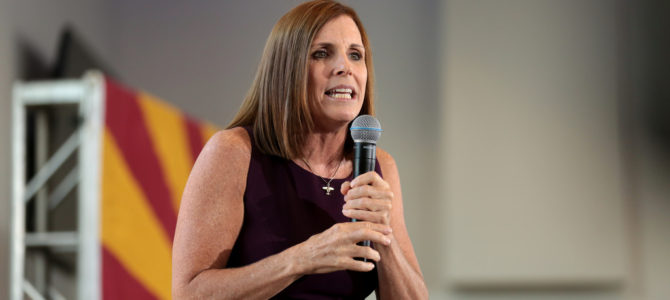Arizona Gov. Doug Ducey announced today that, as expected, he’ll be appointing Rep. Martha McSally to the Arizona Senate seat formerly held by John McCain and currently occupied by Jon Kyl. McSally was the obvious choice to fill this seat, but the unique situation she confronts electorally is going to be a real challenge if she is to hold it beyond 2020.
Under Arizona law, Ducey’s appointment of McSally means she is essentially tasked with filling out a sequence of two year terms. She will have to run for re-election in 2020, and run again in 2022. The demands of running non-stop are hard enough when you’re talking about a House seat. In this case, McSally will have to do something she hasn’t done before – win statewide – in back to back election cycles.
On paper, McSally looks like an ideal candidate. She has a Harvard degree, a lengthy record of military service, and an ideologically moderate record in Congress. But as a campaigner, she has much to prove. Her first foray into politics was a loss in a special election nomination fight (to Federalist contributor Jesse Kelly); she then lost a general election campaign for the same seat by less than 1 percent; she then won the district in the following election after a recount by 167 votes. McSally has won only one election by a significant margin, and her loss to Kyrsten Sinema in 2018’s Senate election was by less than 3 percent of the vote. The historical trend is clear: win or lose, it’s usually very close.
This is why the memo that the McSally campaign put out in an attempt to explain their defeat in 2018 is so disappointing, and reveals the need for a whole new team if she is to hold this Senate seat in the next two elections. The memo blames all sorts of disadvantages for McSally’s defeat, particularly “an unprecedented Democrat opponent who spent millions of dollars of misleading ads funded by liberal billionaires.” This is less unique than the consultants who penned the memo apparently thought it sounds. Essentially, the argument goes, McSally was significantly damaged by having to beat Kelli Ward and Joe Arpaio in the Republican primary (in fact, she was fortunate the two took support from each other), and that within that primary, she faced – well, I’ll let them tell it:
“The McSally campaign having spent over $2 million dollars from their own war chest to defend public perception and set the record straight during a hardfought battle that took place in the face of an unprecedented assault of over a million dollars of negative ads funded by liberal billionaires George Soros and Chuck Schumer.”
First, surprising at it may be to the authors of this memo, just because he is from New York and Jewish does not make Chuck Schumer a billionaire. Second, if a Democratic Super PAC taking potshots at the most electable candidate is something you view as unprecedented, you haven’t been around politics very long. Third, blaming ads and the media doesn’t compensate for what you didn’t do as a candidate.
The complaint here is of a piece with the rest of the excuse making that has come after McSally’s failure to win – “it’s not our fault, we faced unprecedented odds, we did pretty much everything right.” That’s not the kind of hard look a candidate needs to make after they run behind Governor Ducey’s statewide number by 17 points. The answer is not “outside groups let Sinema go unanswered with over $4 million of TV ads for over four months.” It’s that you didn’t run the campaign you needed to run, or target the areas you needed to target. The most glaring defect of the memo is the blame she puts on a geographical disadvantage – which is an interesting argument given that in losing to Sinema, she lost her own congressional district. McSally’s team even blames the same factor that absolutely helped Republicans win Senate seats in other states – the Kavanaugh battle:
“A certain segment of AZ Republicans was outright hostile to President Trump, and was against the Kavanaugh appointment. This segment of moderate Republicans, especially woman [sic], proved very difficult to bring home to a Republican candidate that supported President Trump and the confirmation of Justice Kavanaugh.”
The 2020 election McSally now faces is likely to be even more contentious than the 2018 battle for Jeff Flake’s seat, and the environment she will have to navigate will be even more complicated. Now she will be running in tandem with Donald Trump’s re-election effort, and she will have to deal with Arizona’s complicated view of the president as well as continuing revelations from Democratic congressional investigations into his administration. Arizona Democrats have several potentially strong Senate candidates, and McSally will have to work hard to prevent a primary challenge like the one she faced before from a Trump-loyalist candidate.
My concern that Martha McSally reminds me of an NFL team that always plays down to the level of its competition prompted this response from Gov. Ducey.
https://twitter.com/yvonnewingett/status/1075083415437733893
That’s all fine and good, but it’s beside the point. Whether she holds the seat in 2020 comes down to whether McSally has the capacity and the humility to learn from her mistakes as a campaigner, and chooses a new political team with a proven record of winning in purple states. Those around her need to ensure that she does.








